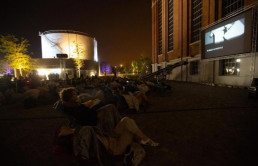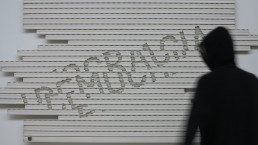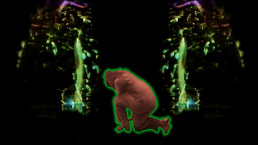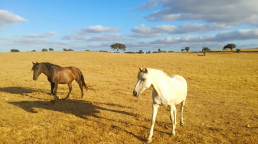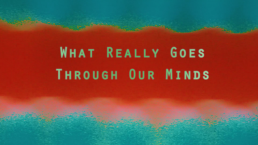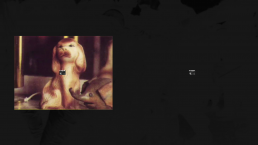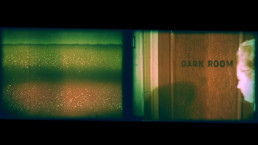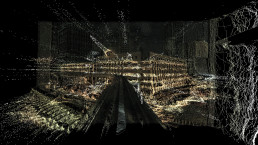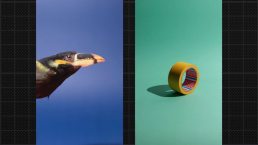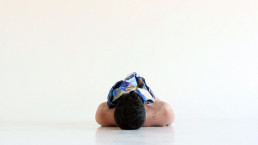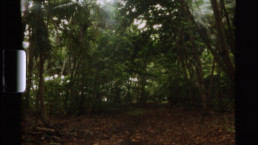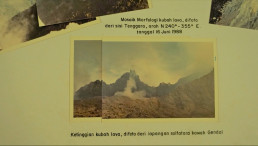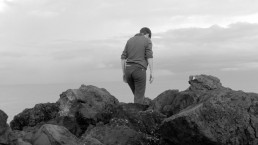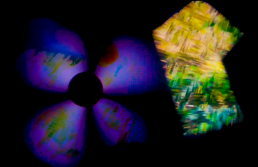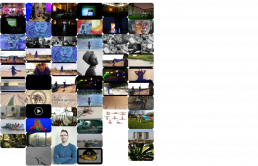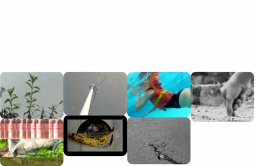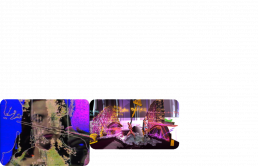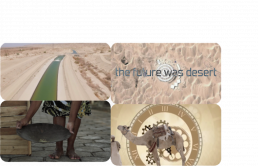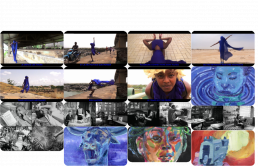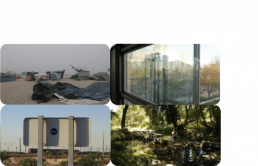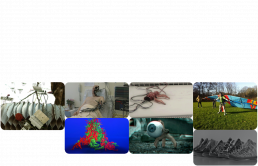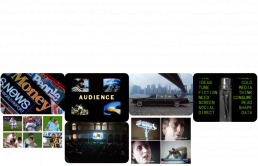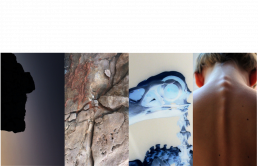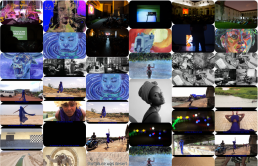“FUSO 2019 – 27 Agosto a 1 Setembro
29 Agosto, 22h
Jardim do Museu de Arte, Arquitectura e Tecnologia (MAAT)
Programa de JEAN FRANÇOIS-CHOUGNET (França)
OPEN CALL
Duração: 72’
Com a globalização, todos nós temos acesso ilimitado a um conjunto de informações que as gerações passadas nunca tiveram. Não se trata propriamente de um privilégio, aliás.
Nesse contexto, a vídeo arte questiona os modelos tradicionais de representação.
Mais do que nunca, o Open Call do Fuso 2019 revela a diversidade das práticas da vídeo arte feita em Portugal e/ou por artistas portugueses. 147 projetos foram submetidos, o que é mais um sinal da vitalidade da cena contemporânea portuguesa. A força e originalidade dos projectos propostos por jovens artistas, mesmo muito jovens artistas (muitos projectos foram apresentados por artistas nascidos na década de 1990) tornou a selecção difícil. A proposta de 14 obras de 14 artistas favoreceu imagens de um mundo em mutações.
Como a acção do homem e as mudanças climáticas estão a afectar o passado, o presente e o futuro (?).
ISAQUE PINHEIRO (PT) // A Gregos e a Troianos, 2018, 1’02’’
O vídeo “A Gregos e a Troianos” foi pensado e construído enquanto desdobramento de uma obra escultórica interactiva e performativa, igualmente de minha autoria. Construída a partir de uma persiana velha recuperada do lixo, esta obra gira em torno de uma janela posicionada entre o público e o mundo. O público é convidado a interagir com a obra num jogo de muitas possibilidades tais como diversidade, diferença, tolerância, reflexão, entre outras, criando múltiplas possibilidades de paisagem. No vídeo, a persiana inicialmente em forma de rectângulo, forma eficaz para tapar a vista de uma janela na sua totalidade, apresenta-se repleta de buracos resultantes de possíveis apedrejamentos. Uma figura entra em cena, e recorrendo ao deslizamento das lâminas da persiana, para a esquerda e para a direita sem descartar o centro, altera os contornos do objecto. O que antes era uma forma geométrica rígida e demasiado convencional, dá lugar a um contorno orgânico, multilateral, digno de uma assembleia. Assim, é desvendada uma outra organização, transformando a persiana numa nova paisagem onde os buracos que eram apenas ruído inscrevem agora a palavra “Democracia”. Uma vez que a palavra se apresenta perfeitamente representada, a narrativa toma o sentido inverso. Novamente as lâminas são movidas, para outra vez serem reorganizadas em função do contorno do objeto. No centro, a palavra “Democracia” é sacrificada a fim de novamente se atingir o contorno limpo de um rectângulo, mesmo que repleto de buracos sem sentido. O vídeo a preto e branco é mudo, não tem som, e deverá ser apresentado em loop criando assim uma narrativa cíclica pretendida.
Isaque Pinheiro, Porto
Ideia, concepção e realização: Isaque Pinheiro | Montagem: Ana Maria de Carvalho e Isaque Pinheiro | Direcção de fotografia: Ana Maria de Carvalho e Isaque Pinheiro | Interpretação: Isaque Pinheiro | Produção: Isaque Pinheiro e Ana Maria de Carvalho
BIO
Isaque Pinheiro nasceu em Lisboa, em 1972. Artista plástico vive e trabalha no Porto. Conta com exposições individuais no Paço Imperial no Rio de Janeiro e em galerias como Caroline Pagès (Lisboa), Mário Sequeira (Braga), Presença (Porto), Esther Montoriol (Barcelona), Laura Marsiaj (Rio de Janeiro), Moura Marsiaj (São Paulo) e Ybakatu (Curitiba), destacam-se também participações em exposições colectivas no Stenersen Museum (Oslo), Centro Galego de Arte Contemporânea (Santiago de Compostela) e Caixa Cultural (Rio de Janeiro). Está representado na Coleção de Arte Fundação EDP | MAAT (Lisboa), Fundação PLMJ, Museu da Bienal de Cerveira, Fundação Caixanova (Espanha), Centro Galego de Arte Contemporânea (Santiago de Compostela) e Fundação Edson Queiroz (Fortaleza, Brasil), entre outras.
SOFIA CAETANO (PT) // Water you broke my heart (by Fatty Con Fetti), 2019, 2’47’’
Cresci a pensar que a água era uma amiga limpa, mas no final de contas, apercebi-me de que me estava a afogar numa mentira.
Vídeo & letra: Sofia Caetano & Fatty Con Fetti | Composição Musical: Elliot Sheedy | Mastering: Aaron Sheedy | Produção: The Spectacular House
BIO
Sofia Caetano vive e trabalha entre Pittsburgh, Pensilvânia e os Açores. Estudou em variadas instituições e foi recipiente de vários tipos de diplomas, até deu aulas em universidades, talvez ainda o faça porque gosta. O seu trabalho centra-se na relação do cinema com o espectador. Sofia explora o espaço entre a bidimensionalidade do ecrã do cinema e a tridimensionalidade da sua relação com a instalação. Investiga forma e modos de apresentação, concentrando-se na sua interação com o espectador. O seu trabalho é, especulativamente falando, existencialmente cómico. Sofia juntou-se a Elliot Sheedy e fundou uma produtora, The Spectacular House. Actualmente, está a filmar a sua primeira longa-metragem, The Happiest Man – pergunta-lhe mais sobre este filme musical de ficção científica.
MARGARIDA PAIVA (PT) // Soul Blindness, 2019, 10’
Uma floresta tranquila. Névoa vagueia pelo ar como uma alma perdida. Fantasmas de animais assombram a paisagem. Inspirado em antigas crenças animistas em que plantas, animais e lugares possuem uma essência espiritual distinta, o filme aponta para nossa crescente incapacidade de reconhecer que as outras criaturas são seres conscientes como nós somos.
Realizadora: Margarida Paiva | Fotografia e edição: Margarida Paiva | Música: Caminauta | Mistura de som: Andrew Vailcross | Produção: Margarida Paiva
BIO
Margarida Paiva (1975), natural de Coimbra, vive e trabalha em Oslo. Licenciada em Escultura na Faculdade de Belas Artes da Universidade do Porto em 2000. Em 2007 completou o Mestrado na Academia Nacional das Artes de Oslo. Tem exibido desde 2000 em exposições e festivais internacionais. A curta-metragem Every Story Is Imperfect (2012) foi premiada no festival FOKUS 2014|Nikolaj Kunsthal em Copenhaga. Exposições recentes incluem colectivas na Galeria de Arte Contemporânea Muratcentoventidue em Bari, Galeria MELK em Oslo, Screen City Biennial em Stavanger, Noruega e exposições individuais no Espaço MIRA no Porto e no Museu Intercultural de Oslo.
MARTA LANÇA (PT) E PEDRO CASTANHEIRA (PT) // Fertilizante, 2019, 8’38’’
Eu quis uma casa no campo
e quis ser o que quis inventando
o lugar de abundante gargalhada, silêncio, fumo
e leite para alimentar o ser universal.
foi quando ouvi o lamento de uma ovelha
chorando madrugada fora a sua cria
numa música muito dela,
de todas as mães
procurando em círculos cegos
um animal nunca libertado engolido
por paredes de taipa.
aí percebi que era este o lugar
que eu quis inventar.
Produção: BUALA | De Marta Lança e Pedro Castanheira
BIO
Marta Lança, Lisboa (1976). Doutoranda em Estudos Artísticos (FCSH-UNL). Criou as publicações independentes: V-ludo (1999-01), Dá Fala (Cabo Verde 2004), Jogos Sem Fronteiras (2008 co-ed) e a plataforma BUALA. Escreveu em várias publicações culturais. Traduziu livros de Asger Jorn e Achille Mbembe. Colaborou com a I Trienal de Luanda e com os Festivais de Cinema de Luanda e Dockanema, Maputo. Passa temporadas no Brasil. Programou o Roça Língua, encontro de escritores lusófonos, o ciclo Paisagens Efémeras, dedicado a Ruy Duarte de Carvalho (2015), o programa Expats para o FITEI, com Rita Natálio (2015), Vozes do Sul para o Festival do Silêncio (2017), conferências do projeto NAU!, do TEP (2018) e, com Raquel Lima, o ciclo Para nós, por nós: produção cultural africana e afrodiaspórica em debate (2018). Em cinema rodou várias séries em países africanos. Entra no filme Tempo Comum, de Susana Nobre (2018). Fez performances com o Alberto Pimenta.
Pedro Castanheira, Lisboa (1980). Pós-graduado em Filologia Alemã e Portuguesa pela Universidade Nova de Lisboa (Faculdade de Ciências Humanas e Sociais, 2004) e bolseiro na Universidade Humboldt de Berlim (2002). Frequenta a Escola Superior de Teatro e Cinema e a Escola de Fotografia AR.CO em Lisboa, e mais tarde obtém o grau de Mestre em Direcção de Fotografia na Escola de Cinema e Audiovisual de Madrid (ECAM, 2007). Em 2007, recebe o Prémio Kodak Film Spain e é convidado a trabalhar com o lendário diretor de fotografia Vilmos Zsigmond na Masterclass de Cinematografia de Budapeste. Diretor de fotografia em produções nacionais e internacionais de cinema, documentário, publicidade, teatro e televisão, nomeadamente em Espanha, Alemanha, Reino Unido, Dinamarca, Hungria, Polónia, Palestina, Líbano, Israel, Argentina, Brasil, Chile e Portugal. Realiza cinco filmes documentais sobre teatro. Fez a imagem do projeto artístico “O Atelier Verde”, de Alexandra do Carmo (2018).
GONÇALO NOGUEIRO NEVES (PT) // What Really Goes Through Our Minds: The Times They Are A-Changin, 2019, 6’54’’
Com o desenvolvimento da tecnologia, hoje em dia todos nós temos acesso ilimitado a um conjunto de informações que as gerações passadas nunca tiveram. Não se trata propriamente de um privilégio, aliás, está bem longe disso. Querendo ou não, somos de certa forma “obrigados a consumi-las” mesmo sem nos apercebermos. Sejamos nós um adulto, um idoso, uma criança, ou um estudante universitário, como é o meu caso. Para isso, basta ter acesso à internet e um dispositivo. Se por um lado, é graças a este avanço tecnológico que chegamos onde estamos, com todos os benefícios que nos trouxe; por outro lado, o reverso da moeda pode, por vezes, ser bem catastrófico. Inúmeras são as consequências negativas e nocivas que este desenvolvimento tecnológico gerou. Neste filme, olha-se diretamente para a banalização da violência. No fundo, o meu vídeo retrata o conteúdo que vemos todos os dias de manhã à noite na televisão, Internet ou qualquer tipo de media. Pelo menos numa primeira parte. Numa segunda fase, retrata o que aconteceria se os mortos pudessem falar.
Realizador: Gonçalo Nogueiro Neves | Assistente de Realização: Valentina Caetano | Produção: UCP
BIO
Em 2014 terminei o ensino secundário no Colégio da Rainha Santa Isabel (CRSI) em Coimbra, tendo recebido um Quadro de Excelência por comportamento e pela média final de 16,03 valores. Sou licenciado em Cinema na Universidade da Beira Interior (UBI) na Covilhã tendo recebido uma Carta de Recomendação pelo Director de Curso Prof. Dr. Luís Nogueira (média final de curso: 14,7). Actualmente frequento o segundo ano do Mestrado de Cinema, Especialização em Som e Imagem na Universidade Católica Portuguesa do Porto (UCP). Até ao momento, trabalhei em vários projectos, curtas metragens entre outros inúmeros trabalhos fora e dentro do âmbito Universitário. Em todas elas, fui o Director de Fotografia com excepção de Muletas, de Luís de Campos (guionista do filme Um Funeral à Chuva). Uma das minhas fotografias serviu de capa para o mesmo filme, no qual fui assistente do Director de Fotografia Fábio Guerreiro. Entre outros projectos, também realizei alguns filmes, como é o caso de Ponta Negra (2016), Ghosts, Records & Recreations (2017), nomeado para Melhor Curta Metragem na segunda edição do Festival Sacalacalaca no México e selecionado para o Puerto Rico International Film Festival, City//Gardens (2018) e 25 Hours In a Day (2018), selecionado para a 10ª edição de FUSO – Anual de Vídeo Arte Internacional de Lisboa.
CINZA NUNES (PT) // Périot Meets Acconci, 2019, 2’45’’
Périot meets Acconci aplica a proposta conceptual de Vito Acconci — “while walking a continuous line down a city street. Try not to blink. Each time I blink: snap a photo.” — à experiência de visionamento do filme 21.04.02 de Jean-Gabriel Périot «based on super-fast editing of images from TV, film, advertising, pornography…». Duas pessoas assistem simultaneamente ao filme enquanto tentam não piscar os olhos; cada vez que o fazem, a imagem é revelada.
Realização e montagem de Cinza Nunes | Performance por Ricardo Vieira Lisboa e Cinza Nunes | Imagens retiradas do filme 21.04.02 de Jean-Gabriel Périot | Produzido por Cinza Nunes
BIO
Cinza Nunes (Faro, 1988) é umx artista multidisciplinar que trabalha principalmente com vídeo e performance. Teve uma exposição individual na Galeria Germinal em 2017 (instalação, colagem, vídeo e desenho) e participou em três exposições colectivas (2018/19), teve dois filmes seleccionados para o FUSO Anual de Vídeo Arte Internacional de Lisboa em 2017/18 (prémio do público em 2018) e um filme seleccionado para a Competição Nacional Estreias do Festival Córtex em 2019.
SOFIA CAETANO (PT) // North, 2018, 7’07’’
Enquanto o capitão aguenta o barco, as perguntas dos investigadores continuam por responder.
Produzido por The Spectacular House
JOÃO PEDRO FONSECA (PT) // Animal Fantasma, 2019, 4’23’’
Um monólogo, de um ser que não sente o seu próprio corpo, tem lugar num mundo já abandonado pela natureza, onde a industrialização chegou ao seu limite e as cidades não dormem. A luz artificial é tão semelhante ou igual à natural, cá fora todos estão expostos, mas por dentro tendem a ser invisíveis. Só quem não está preso enxerga com cuidado o caminho da ruína e da destruição que a humanidade está a seguir, com um olhar específico, um olho de um animal.
BIO
João Pedro Fonseca, 1990, Portugal, trabalha em vários campos artísticos. Estudou pintura na Faculdade de Belas-Artes da Universidade de Lisboa, mas concentra os seus principais trabalhos na área da performance, videoarte, instalação e fotografia. Realizou exposições em galerias de Montpellier, Lisboa, São Paulo, Cidade do México, Maiorca e Londres, destacando-se em vários festivais como: FUSO, LOOPS.LISBOA, Mundos Alternativos, Videoformes, ARTNIT – Festival de Arte Contemporânea e FICMA – Festival Internacional de Cinema com Medios Alternativos. Está intimamente ligado ao teatro, trabalhando em cenografia e video desde 2016. Fez a ópera L’Isola Disabitata (CCB, Lisboa, 2016) de Carlos Pimenta, as peças A Grande Vaga de Frio (de Orlando por Virginia Woolf) (Lisboa, CCB, 2017) e Morte de um Caixeiro Viajante (Almada, Benite, 2018) de Carlos Pimenta, Sócrates tem de Morrer (Guimarães, CCVF, 2018) de Mickael de Oliveira, Testamento em três actos (CAL, Lisboa, 2018) dos SillySeason, Fraternidade (Aveiro, 2018) de Miguel Moreira/Útero, e, as óperas O Castelo Barba-Azul e Voz Humana (Lisboa, CCB, 2019) de Olga Roriz. Em 2019 criou a trilogia de performance/teatro Anatomia da Extinção (Appleton), Fragmentos de uma Anatomia (ZONA) e Extinção (Desterro). É director da ZONA – Residências Artísticas e da showcase de videoarte LOOPCAVE. É co-fundador das labels de música electrónica contemporânea e experimental “No, She Doesn’t” e “ZABRA records”.
JOÃO PAULO SERAFIM (PT) // Extinct Birds , 2019, 5’14’’
Vídeo ensaio que através da história natural e da apropriação de imagens da internet, questiona os modelos tradicionais de representação, classificação, organização de génese científica, justapondo à ficção do entretenimento. Como a acção do homem e as mudanças climatéricas estão a afectar as aves nos dois últimos séculos.
Produzido por Improbable Museum films
BIO
João Paulo Serafim (Paris) artista visual, editor e professor tem vindo a desenvolver o seu trabalho em instalações usando a fotografia, video, objectos e novos medias.
MAX PROVENZANO (VE) // Inflasjon, 2019, 2’30’’
Inflasjon (Inflação) Uma reflexão metafórica sobre o actual território venezuelano e a sua situação, através da realização de uma acção local: a inflação progressiva de um globo terrestre sobre o meu corpo. O ar penetra e transforma o objecto, expandindo o limite da capacidade do recipiente, que apesar de inflável, permanece latente em territórios indefinidos. A instabilidade é gerada a partir de uma busca por condições de equilíbrio, para manter o meu próprio ar contido no globo estático, aludindo a Atlas, titã da mitologia grega condenado a carregar sobre os seus ombros os pilares que mantinham a Terra separada dos Céus. O meu corpo está numa superfície estável, a horizontalidade concebida e descrita como uma outra abordagem para a escultura do titã, a sua punição era manter o orbe, distinguindo as suas capacidades, a sua resistência. O mundo é sustentável quando há processos inflacionários degenerados na economia de países em condições precárias?
Video Performance: MAx Provenzano | Assistente de câmera: Naysa Andrade | Produção: MAx Provenzano
BIO
MAx Provenzano (Venezuela, 1986). Artista visual e performático que trabalha na relação entre corpo, objecto e meio ambiente. Graduado pela Escola de Química da Faculdade de Ciências da UCV (2011). Estudou no Laboratório de Fotografia da Faculdade de Ciências da UCV (2008) e fez vários workshops sobre História da Arte Venezuelana na Galeria Nacional de Arte (2011), e Fotografia na Organização Nelson Garrido (2013)). Exposições individuais: “[a] deriva” Galeria Arteriet, Kristiansand, Noruega 2019; “Elucidaciones”, El Anexo / Arte Contemporânea, Caracas, 2017; “READYMAx”, Abra Caracas, Caracas, 2017; “El Tercer Mundo” (prémio de exposição 2014 no Salón Joven Joven), Museu de Arte de Valência, 2015; “[Inflexiones]”, ONG, Caracas, 2014. Exposições Coletivas (selecção): Banesco Youth Salon com a FIA (edições XVII e XVIII); Bienal 67 Salão Arturo Michelena; “Esqueje”, Abra Caracas, Caracas; “Obra Aberta: Eixos da Liberdade”, Museu de Arte Contemporânea de Zulia (MACZUL); I Bienal Internacional de Performance de Caracas (BIPCA). O seu trabalho também foi exibido no Brasil, México, Colômbia, Espanha e Finlândia. Actualmente vive e trabalha em Lisboa, Portugal.
TÂNIA DINIS (PT) // Teresa, 2017, 4’37’’
A imagem fragmentada de um registo íntimo. A impressão de momentos esquecidos no tempo mas prontos para emergirem do esquecimento que permitem construir uma possível história: a história que queremos ver.
Um filme de Tânia Dinis | Com Horácio Guiamba | Texto de Pedro Bastos | Música de Jorge Quintela Produção de Tânia Dinis e Jorge Quintela
BIO
Nascida a 1983 Tânia Dinis concluiu o mestrado em Práticas Artísticas Contemporâneas na FBAUP no ano de 2015. O seu trabalho atravessa diversas perspectivas e campos artísticos como o da fotografia, performance, cinema e estética relacional. Tânia Dinis apropria-se de imagens de arquivo da família e outras captações de imagens, numa relação tempo-imagem-memória.
Produz em 2013, a primeira curta-metragem, Não são favas, são feijocas, premiada em vários festivais. Realizou também os filmes Arco da Velha (2015) e Laura (2017), este último distinguido com o prémio de melhor curta-metragem no Arquivo em Cartaz – Festival Internacional de Cinema de Arquivo. A sua última curta-metragem Armindo e a Câmara Escura teve estreia na Escócia em 2019.
Programou a secção Sangue Novo do 22º Festival de cinema Luso Brasileiro de Santa Maria da Feira em 2019. Nesse mesmo ano apresentou a peça “Bastidores” que partiu do arquivo fotográfico do Teatro Rivoli para o 87º Aniversário do Rivoli e “Linha de Montagem”, na qual foi criadora com Pedro Bastos e Sara Costa.
Tânia Dinis foi seleccionada para ARTISTA NO CENTRO 2019/2021 pela Oficina – Guimarães e tem colaborado em projectos com curadoria de Eduarda Neves, com a Produtora Bando à Parte e com o CAAA – Centro para os Assuntos da Arte e Arquitectura. Integrou exposições individuais e colectivas em espaços como: Sputenik the window Porto, A Gentil Carioca-Abre Alas Brasil, Maus Hábitos Porto, Solar – Galeria de Arte Cinemática, Museu Júlio Dinis Ovar, Bienal de Cerveira, Encontros da Imagem Braga, Cinémathèque québécoise.
YURI FIRMEZA (BR) // Apenas um Gesto Ainda Nos Separa do Caos, 2017, 9’31’’
A dimensão política e poética dos vulcões. De um lado, uma ameaça; de outro, a sua conotação simbólica. Uma relação proustiana com o tempo, em que Madeleine se transforma na fumaça de um Gudang Garam ou na melodia de uma antiga lambada.
Realização: Yuri Firmeza | Direcção de fotografia: Yuri Firmeza | Som (Desenhista ou Editor ou Técnico): Rudy Cahyono | Montagem e Edição: Rudy Cahyono | Argumento: Yuri Firmeza | Banda sonora original: Rully Shabara
BIO
Yuri Firmeza é professor do curso de Cinema e Audiovisual da Universidade Federal do Ceará. Actualmente realiza o doutoramento em Belas-Artes na Universidade de Lisboa. Participou em festivais de cinema e exposições, entre eles: 21st Videoex – International Experimental Film & Video Festival Zurich/ Switzerland, 64th e 62nd International Short Film Festival Oberhausen/Germany; 14th Biennale Jogja: Stage of Hopelessness – Yogyakarta/Indonesia; 31ª Bienal de São Paulo/ Brasil.
SANDRA ROCHA (PT) // Para que servem as pedras senão para serem deslocadas?, 2017, 5’10’’
Uma vontade de mover pedras que, precisamente pelo seu pelo peso simbólico, se interpõem no nosso caminho. Fazê-lo com a força de um gigante arcaico que desafiasse e finalmente vencesse os deuses; ou com a força de um humano que, finalmente, enganasse esses mesmos deuses vingando Sísifo, libertando-o do seu castigo eterno : o castigo de ser homem, de ser mulher, de ser mortal.
BIO
Sandra Rocha nasceu nos Açores, na ilha Terceira, em 1974. Vive em Paris. Nos últimos anos tem desenvolvido uma fotografia de abordagem artística mais poética. Globalmente as imagens oferecem universos de água, são habitadas por jovens imberbes, animais singulares, paisagens estranhas… Rondam a noção do absurdo, a ideia de que não há sentido a ser encontrado no mundo para além do significado que damos a ele. Denunciando um incómodo onde, num primeiro olhar apenas vemos beleza e harmonia, o trabalho é, num sentido amplo, sobre a falta de significado, amoralidade e injustiça do mundo. Nos seus últimos projetos Sandra Rocha tem privilegiado o livro como suporte de apresentação. Tem publicadas as seguintes monografias: Dérive des Baigneuses (Filigranes 2017); La Vie Immédiate, (LOCO 2017); Le Silence des Sirènes, (LOCO 2016); Anticyclone (Auto Edição, 2015); Há Metafísica Bastante em não Pensar em Nada (CML, 2009).
MARCOS KUZKA (BR) // Pong Ping, 2019, 1’10’’
O homem é natureza. Entretanto, já não nos lembramos disso e tentamos fingir que tudo continua como era antes. A fronteira entre o mundo virtual e a realidade que nos rodeia é cada vez mais permeável. O vídeo “PONG-PING” é um duelo entre o objecto ícone da virtualidade, o telemóvel, contra o ambiente, refém de uma TV de plasma ⏤ isso até quando houver luz.
BIO
Marcos Cunha, conhecido por “Kuzka,” é músico, compositor e vídeo maker. Colabora com vários artistas onde toca diversos instrumentos e adiciona samplers pré-gravados aproximando o som acústico do eletrónico. Nos últimos 15 anos compôs música para longas-metragens e curtas além de séries para a TV. Kuzka também é um realizador de vídeo-arte onde explora a utilização do som sob a perspectiva da imagem em movimento. Participou de concertos com as cantoras Fernanda Abreu, Paula Morelenbaum, Marina Lima e Adriana Calcanhotto, com quem fez uma turné do álbum “Adriana Partimpim”, vencedor de Grammy Latino 2006. Em 2009, concorreu ao Grammy Latino para melhor engenheiro de som no disco “Telecoteco” de Paula Morenlenbaum, do qual foi produtor. Lançou quatro discos, “Fábio Fabuloso” e “Pasti” (bandas sonoras), o disco ”&” em parceria com o compositor Antônio Saraiva e “Banquete das Cabeças” uma releitura do clássico primeiro disco dos Secos e Molhados. Realizou mais de 20 projetos de música para cinema: entre eles ”Fábio Fabuloso” vencedor do prémio de melhor documentário no Festival do Rio e no Festival internacional de cinema de São Paulo, e ”Só dez por cento é mentira” vencedor do Festival de Paulínia e o Fest Cine Goiânia. Em 2013 realizou sua primeira exibição de vídeo arte no espaço Bikini em parceria com Raul Mourão em NYC. Também participou da coletiva ADIV no Ateliê da Imagem e na DOTMOV na fábrica da Bhering com o vídeo “os horizontes se encontram no infinito” ambos em 2016, no Rio de Janeiro.
“FUSO 2019 – August 27 to Septembre 1“
August 29, 10pm
Jardim do Museu de Arte, Arquitectura e Tecnologia (MAAT)
Program by JEAN FRANÇOIS-CHOUGNET (France)
OPEN CALL
Running Time: 72’
Due to globalization, we all have an unlimited access to a whole range of information which previous generations never had. Moreover, it is not exactly a privilege.
In this context, video art questions the traditional models of representation.
More than ever, the Fuso 2019 Open Call reveals the diversity of practices of video art made in Portugal and/or by Portuguese artists. 147 projects were submitted, which is another sign of the vitality of the contemporary Portuguese scene. The strength and originality of the projects proposed by young artists, truly young artists (many projects were presented by artists born in 90s) made the selection difficult. The proposal for 14 pieces by 14 artists favoured images of a world in mutation.
How human actions and climate changes are affecting the past, present and future (?).
ISAQUE PINHEIRO (PT) // A Gregos e a Troianos, 2018, 1’02’’
The video “A Gregos e a Troianos” was conceived and constructed as an unfolding of an interactive and performative sculptural work, also authored by me. Built from an old shutter recovered from the trash, this work revolves around a window positioned between the public and the world. The public is invited to interact with the piece in a game of many possibilities such as diversity, difference, tolerance and reflection, among others, creating multiple landscape possibilities. In the video, the shutter, initially in the form of a rectangle, an efficient form to completely obscure the view from a window, presents itself full of holes resulting from possible stoning. A figure enters the scene, and appealing to the gliding of the shutter´s blades, to the left and to the right, without discarding the centre, alters the contours of the object. What used to be a rigid and overly conventional geometric form, gives way to an organic, multilateral contour, worthy of an assembly. And so, another organization is unravelled, transforming the shutter into a new landscape in which the holes that were only noise now inscribe the word “Democracy”. Once the word is perfectly represented, the narrative takes on the inverse meaning. Once again the blades are moved, so that once again they are reorganized around the object´s contours. At the centre, the word “Democracy” is sacrificed in order to once again attain the clean contour of a rectangle, even if it is full of meaningless holes. The video is black and white and silent, with no sound, and must be presented in a loop, thus creating the intended cyclical narrative.
Isaque Pinheiro, Porto
Idea, conception and direction: Isaque Pinheiro | Editing: Ana Maria de Carvalho and Isaque Pinheiro | Director of Photography: Ana Maria de Carvalho and Isaque Pinheiro | Performance: Isaque Pinheiro |Production: Isaque Pinheiro and Ana Maria de Carvalho
BIO
Isaque Pinheiro is an artist who was born in Lisbon in 1972, and lives and works in Porto. There have been individual exhibitions at Paço Imperial in Rio de Janeiro, and at galleries such as Caroline Pagès (Lisbon), Mário Sequeira (Braga), Presença (Porto), Esther Montoriol (Barcelona), Laura Marsiaj (Rio de Janeiro), Moura Marsiaj (São Paulo) and Ybakatu (Curitiba). Some highlights of participation in collective exhibitions are: the Stenersen Museum (Oslo), the Centro Galego de Arte Contemporânea (Santiago de Compostela) and the Caixa Cultural (Rio de Janeiro). He is also represented in the Art Collection of the EDP | MAAT Foundation (Lisbon), the PLMJ Fundation, the Cerveira Biennale Museum, the Caixanova Fundação (Spain), the Galego Contemporary Art Centre Arte (Santiago de Compostela) and the Edson Queiroz Fundation (Fortaleza, Brazil), among others.
SOFIA CAETANO (PT) // Water you broke my heart (by Fatty Con Fetti), 2019, 2’47’’
I grew up thinking water was a clean friend, but in the end, I realized I had been sinking into a lie.
Video & Words: Sofia Caetano & Fatty Con Fetti | Musical Composition: Elliot Sheedy | Mastering: Aaron Sheedy | Production: The Spectacular House
BIO
Sofia Caetano was born in Ponta Delgada – in the Portuguese paradisiac Azores islands. Sofia went to schools and earned all kinds of degrees, she even taught at some institutions, maybe she still does, because she likes it. Withal, her works centre around film and spectatorship. Sofia is a filmmaker who works between the flatness of the filmic screen and the spaciousness of its relationship with installation. She investigates forms and presentation modes, concentrating on the relationship these develop with those who experience the works: the spectator. Her work is, existentially, more or less comedic. Speculatively speaking, it is also provocative. Sofia buckled up with Elliot Sheedy and co-founded The Spectacular House, a Media Art production house that develops commercial and original content, in 2016. She is currently writing her first feature film, The Happiest Man – ask her about this sci-fi musical film.
MARGARIDA PAIVA (PT) // Soul Blindness, 2019, 10’
A quiet forest. Mist wanders through the air like a lost soul. The ghosts of dead animals haunt the landscape. Inspired by ancient animist beliefs in which plants, animals and places all possess a distinct spiritual essence, the film points to our growing inability to recognise that other creatures are just as sentient and mindful as we are.
Director: Margarida Paiva |Photography and editing: Margarida Paiva | Music: Caminauta | Sound Mixing: Andrew Vailcross | Production: Margarida Paiva
BIO
Margarida Paiva (1975, Portugal) is a visual artist living in Oslo working, with film and photography. In 2007, she completed her Master degree at the Oslo National Academy of the Arts, and previously studied at the Faculty of Fine Arts in Porto and the Art Academy in Trondheim. Her work has been widely shown in exhibitions and international festivals, and she has received several art grants. The short film Every Story Is Imperfect (2012) was awarded at the FOKUS 2014, Nikolaj Kunsthal festival (DK). Recent exhibitions include group shows at Muratcentoventidue Contemporary Art Gallery, Bari (IT), Galleri MELK, Oslo (NO), Screen City Biennial in Stavanger (NO), and solo exhibitions at MIRA Contemporary Art Space in Porto (PT) and Oslo Intercultural Museum (NO).
MARTA LANÇA (PT) E PEDRO CASTANHEIRA (PT) // Fertilizante, 2019, 8’38’’
I wanted a house in the country.
and I wanted to be what I wanted by inventing the place
of laughter, silence, smoke
and milk to feed the universal being.
that’s when I heard the regret of a sheep
crying out the dawn all night long
in a song of her own,
and of all mothers
looking in blind circles
an animal never released
swallowed by mud walls.
Then I realized that this was the place
that I wanted to invent.
Production: BUALA | By Marta Lança e Pedro Castanheira
BIO
Marta Lança, Lisbon (1976). PhD student in Artistic Studies (FCSH-UNL). She created the independent publications: V-ludo (1999-01), Dá Fala (Cape Verde 2004), Games Without Borders (2008 co-ed) and the BUALA platform. Marta has written in several cultural publications. Translated books by Asger Jorn and Achille Mbembe. She collaborated with the First Triennial of Luanda and Dockanema Festival, Maputo. Spends seasons in Brazil. Marta has programmed Roça Língua, a meeting of Portuguese-speaking writers, the cycle Paisagens Efémeras, dedicated to Ruy Duarte de Carvalho (2015), the Expats program for FITEI, with Rita Natálio (2015), Vozes do Sul for the Festival of Silence (2017), conferences of the NAU!, TEP (2018) and, with Raquel Lima, the cycle “Para nós por nós: African and Afro-Diasporic cultural production in debate” (2018). In cinema, she ran several series in African countries, and also appears in the film Ordinary Time, by Susana Nobre (2018). Marta Lança performed with Alberto Pimenta.
Pedro Castanheira, Lisbon (1980). Holds a Postgraduate degree in German and Portuguese Philology from the Nova University of Lisbon (Faculty of Humanities and Social Sciences, 2004) and is a fellow at Humboldt University Berlin (2002). He attends the School of Theatre and Cinema and the School of Photography AR.CO, in Lisbon, and later obtains a Master’s degree in Photography Direction from the School of Cinema and Audiovisuals of Madrid (ECAM, 2007). In 2007, he received the Kodak Film Spain Award and is invited to work with the legendary cinematographer Vilmos Zsigmond at the Budapest Masterclass of Cinematography. Is a Director of Photography in national and international film, documentary, publicity, theatre and television productions in Spain, Germany, UK, Denmark, Hungary, Poland, Palestine, Lebanon, Israel, Argentina, Brazil, Chile and Portugal. He has also made five documentary films about theatre. Made the image for the artistic project “The Atelier Verde”, by Alexandra do Carmo (2018) and many others.
GONÇALO NOGUEIRO NEVES (PT) // What Really Goes Through Our Minds: The Times They Are A-Changin, 2019, 6’54’’
With the development of technology, nowadays we all have unlimited access to a set of information that past generations never had. It is not really a privilege; far from it. Whether we want to or not, we are somehow “forced to consume it” even without realizing it. Whether we are an adult, an elderly person, a child, or a college student, as is my case. All we need is access to the internet and a device. If, on the one hand, it is thanks to this technological advance that we have arrived where we are, with all the benefits it has brought us; on the other hand, the reverse can sometimes be very catastrophic. There are countless negative and harmful consequences of this technological development. In this film, one looks directly towards the trivialization of violence. My video portrays the content we see every day, from morning to night, on television, the Internet or any kind of media. At least in the first part. In a second phase, it portrays what would happen if the dead could speak.
Director: Gonçalo Nogueiro Neves | Assistant Director: Valentina Caetano | Production: UCP
BIO
In 2014 I finished secondary school at Colegio da Rainha Santa Isabel (CRSI) in Coimbra, receiving a Board of Excellence award for behaviour, and a final average of 16.03. I have a degree in Cinema from the University of Beira Interior (UBI) in Covilhã, and have received a Letter of Recommendation from the Course Director, Dr. Luís Nogueira (course average: 14.7). At the moment, I am attending the second year of the Master of Cinema course, Specialization in Sound and Image, at the Catholic University of Porto (UCP). So far, I have worked on several projects, short films, among many other works outside and within the University scope. In all of them, I was the Director of Photography, with the exception of Muletas, by Luís de Campos (screenwriter of A Funeral to the Rain). One of my photographs served as a cover for the same film, in which I was assistant to the Director of Photography, Fábio Guerreiro. Among other projects, I also made some films, such as Ponta Negra (2016), Ghosts, Records & Recreations (2017), nominated for Best Short Film in the second edition of the Sacalacalaca Festival in Mexico and selected for the Puerto Rico International Film Festival, City // Gardens (2018) and 25 Hours In a Day (2018), selected for the 10th edition of the FUSO Lisbon Annual International Video Art Festival.
CINZA NUNES (PT) // Périot Meets Acconci, 2019, 2’45’’
Périot meets Acconci applies the conceptual proposal of Vito Acconci — “while walking a continuous line down a city street. Try not to blink. Each time I blink: snap a photo.” — to the experience of watching the short movie 21.04.02 by Jean-Gabriel Périot «based on super-fast editing of images from TV, film, advertising, pornography…». Two people watch the film at the same time and try not to blink; each time they blink, the image is revealed.
Directed and edited by Cinza Nunes | Performance by Ricardo Vieira Lisboa and Cinza Nunes | Images extracted from the film 21.04.02 by Jean-Gabriel Périot | Produced by Cinza Nunes
BIO
Cinza Nunes (Faro, Portugal, 1988) is a multidisciplinary artist who works mainly with video and performance. They had a solo exhibition at Galeria Germinal in 2017 (installation, collage, video and drawing); participated in three collective exhibitions (2018/19); had two films selected for the FUSO Lisbon Annual International Video Art Festival in 2017/18 (received the public award in 2018); and had a film at the National Premier Competition of Cortéx Festival in 2019.
SOFIA CAETANO (PT) // North, 2018, 7’07’’
While the captain holds the ship steady, the researchers´ questions remain.
Produced by The Spectacular House
JOÃO PEDRO FONSECA (PT) // Animal Fantasma, 2019, 4’23’’
A monologue, by a being who doesn’t feel its own body, takes place in a world already abandoned by nature, where industrialization has reached its limits, and cities don’t sleep. Artificial light is as similar, or equal to, natural light, outside everyone is exposed, but inside they tend to be invisible. Only those who aren’t stuck can carefully see the path of ruin and destruction that humanity is following, with a specific viewpoint, the eye of an animal.
BIO
João Pedro Fonseca, 1990, Portugal, works in several artistic fields. He studied painting at the Faculty of Fine Arts of the University of Lisbon, but concentrates his main works in the areas of performance, video art, installation and photography. He has exhibited in galleries in Montpellier, Lisbon, São Paulo, Mexico City, Majorca and London. He has had works shown at at festivals such as: FUSO, LOOPS.LISBOA, Alternative Worlds, Videoformes, ARTNIT – Festival of Contemporary Art and FICMA – International Festival of Cinema with Alternative Media. He has been closely linked to the theatre, working in scenography and video since 2016, performed the opera L’Isola Disabitata (CCB, Lisbon, 2016) by Carlos Pimenta, the plays A Grande Vaga de Frio (from Orlando by Virginia Woolf) (Lisbon, CCB, 2017) and Death of a Salesman (Almada, Benite, 2018) by Carlos Pimenta, Sócrates tem de Morrer (Guimarães, CCVF, 2018) by Mickael de Oliveira, Testamento em três actos (CAL, Lisbon, 2018) by SillySeason, Fraternidade (Aveiro, 2018) by Miguel Moreira/Útero, and the operas The Blue Beard Castle and Human Voice (Lisbon, CCB, 2019) by Olga Roriz. In 2019 he created the performance / theatre trilogy Anatomia da Extinção (Appleton), Fragmentos de uma Anatomia (ZONA) and Extinção (Desterro). He is the director of ZONA – Residências Artísticas and the video art showcase LOOPCAVE, and co-founder of contemporary and experimental electronic music labels “No, She Doesn’t” and “ZABRA records”.
JOÃO PAULO SERAFIM (PT) // Extinct Birds , 2019, 5’14’’
A video essay which, through natural history and through the appropriation of images from the internet, questions the traditional models of representation, classification and organization of scientific genesis, juxtaposing it to the fiction of entertainment. How the actions of humans and climate change might be affecting birds in the last two centuries.
Produced by Improbable Museum films
BIO
João Paulo Serafim (Paris) is a visual artist, editor and professor, and has been developing his work in installations using photography, video, objects and new media.
MAX PROVENZANO (VE) // Inflasjon, 2019, 2’30’’
Inflasjon (inflation) A metaphorical reflection on the current Venezuelan territory and situation through the realization of a local action: the progressive inflation of a terrestrial globe over my body. The air penetrates and transforms the object, expanding the limit of the container´s capacity which, despite being inflatable, remains latent in undefined territories. The instability is generated from a search for a condition of equilibrium, to maintain my own air contained in the globe static, alluding to Atlas, titan of Greek mythology condemned to carry on his shoulders the pillars that kept the Earth separated from the Heavens. My body lies on a stable surface, the horizontality devised and described as another approach to the sculpture of the titan, its punishment was to hold the orb distinguishing its capabilities, its resistance. Is the world sustainable when there are inflationary processes that are degenerate in the economy of countries in precarious conditions?
Video Performance: MAx Provenzano | Camera assistant: Naysa Andrade | Production: MAx Provenzano
BIO
MAx Provenzano (Venezuela, 1986). Visual and performance artist who works on the relationship between body, object and environment. Graduated from the School of Chemistry of the Faculty of Sciences of the UCV (2011). He studied at the Photography Laboratory of the Faculty of Science UCV (2008) and workshops on Venezuelan Art History at the National Art Gallery (2011), and Photography at the Nelson Garrido Organization (2013). Individual exhibitions include: “Elucidaciones”, El Anexo / Arte Contemporáneo, Caracas, 2017; “READYMAx”, Abra Caracas, Caracas, 2017; “El Tercer Mundo” (2014 exhibition prize at the Salón Joven Joven), Art Museum of Valencia, 2015; “[Inflexiones]”, ONG, Caracas, 2014. Collective exhibitions (selection): Banesco Youth Salon with FIA (XVII and XVIII editions); Biennial 67 Arturo Michelena Hall; “Esqueje”, Abra Caracas, Caracas; “Obra Abierta: Axes of Freedom”, Museum of Contemporary Art of Zulia (MACZUL); I International Performance Biennial of Caracas (BIPCA). His work has also been exhibited in Brazil, Mexico, Colombia, Spain and Finland. Currently, he lives and works in Lisbon, Portugal.
TÂNIA DINIS (PT) // Teresa, 2017, 4’37’’
The fragmented image of an intimate record. The impression of moments forgotten in time, but ready to emerge from obscurity, which allow for constructing a possible history: the history we want to see.
A film by Tânia Dinis | With Horácio Guiamba | Text by Pedro Bastos | Music by Jorge Quintela | Production by Tânia Dinis and Jorge Quintela
BIO
Born in 1983 Tânia Dinis completed her master’s degree in Contemporary Artistic Practice at FBAUP in 2015. Her work crosses several perspectives and artistic fields, photography, performance, cinema and relational aesthetics. Tânia Dinis appropriates from images of the family archive and other image captures, in a temporal-image-memory relationship. In 2013, her first short film, Não são favas, são feijocas, was awarded at various festivals. She also directed the movies Arco da Velha (2015) and Laura (2017), awarded for best short film at the Arquivo em Cartaz – International Archive Film Festival. Her last short-film Armindo e a Câmara Escura was premiered in Scotland in 2019.
She programmed the section SANGUE NOVO for the 22nd Luso Brazilian Film Festival in Santa Maria da Feira, 2019. In that same year she presented the play “Bastidores” from the photographic archive of the Rivoli Theatre for the 87th Anniversary of the Rivoli and “Linha de Montagem”, in co-creation with Pedro Bastos and Sara Costa.
Tânia Dinis was selected for the ARTISTA NO CENTRO 2019/2021 by the Oficina – Guimarães and has collaborated on projects curated by Eduarda Neves, with the production house Bando à Parte and with CAAA – Centro para os Assuntos da Arte e Arquitectura. She has had individual and collective exhibitions in spaces such as: Sputenik the window Porto, A Gentil Carioca-Abre Alas Brasil, Maus Hábitos Porto, Solar – Galeria de Arte Cinemática, Museu Júlio Dinis Ovar, Cerveira Biennale, Encontros da Imagem Braga, Cinémathèque québécoise.
YURI FIRMEZA (BR) // Apenas um Gesto Ainda Nos Separa do Caos, 2017, 9’31’’
The political and poetical dimension of volcanoes. From one side, a threat; from another its symbolic connotation. A Proustian relationship with time, in which Madeleine transforms herself into the smoke of a Gudang Garam or the melody of an ancient lambada dance.
Direction: Yuri Firmeza | Director of Photography: Yuri Firmeza | Sound (Designer, Editor and Technician): Rudy Cahyono | Editing / Publishing: Rudy Cahyono | Script: Yuri Firmeza | Original Soundtrack: Rully Shabara
BIO
Yuri Firmeza is a professor at the Cinema and Audiovisual course of the Federal University of Ceará. Currently, he is pursuing his doctorate in the Fine Arts at the University of Lisbon. He has participated in film festivals and exhibitions, among them: 21st Videoex – International Experimental Film & Video Festival Zurich/ Switzerland, 64th and 62nd International Short Film Festival Oberhausen/Germany; 14th Biennale Jogja: Stage of Hopelessness – Yogyakarta/Indonesia; 31st Biennale of São Paulo/ Brazil.
SANDRA ROCHA (PT) // Para que servem as pedras senão para serem deslocadas?, 2017, 5’10’’
An urge to move rocks which, precisely because of their symbolic weight, place themselves in our way. To do it with the strength of an archaic giant who would challenge and finally win the battle with the gods; or with human strength which, in the end would trick those same gods, avenging Sisyphus, freeing him from this eternal punishment: the punishment of being a man, a woman, mortal.
BIO
Sandra Rocha was born in the Azores, on the Terceira Island, in 1974. She lives in Paris. In recent years, she has developed a photography of a more poetic artistic approach. Globally, the images offer universes of water, are inhabited by beardless youths, singular animals, strange landscapes…they flirt with the idea of the absurd, the idea that there is no meaning to be found in the world beyond the meaning we ourselves give it. Denouncing an inconvenience where, upon first glance, we see only beauty and harmony, the work is, in a broad sense, about the lack of meaning, amorality, and injustice in the world. In her latest projects, Sandra Rocha has favoured the book as a support for presentation. She has published the following monographies: Dérive des Baigneuses (Filigranes 2017); La Vie Immédiate, (LOCO 2017); Le Silence des Sirènes, (LOCO 2016); Anticyclone (Auto Edição, 2015); Há Metafísica Bastante em não Pensar em Nada (CML, 2009).
MARCOS KUZKA (BR) // Pong Ping, 2019, 1’10’’
Men is nature. Alas, we no longer remember that, and we pretend that everything goes on as it always has. The boundary between the virtual world and the reality that surrounds us is increasingly permeable. Pong-ping is a duel between the mobile phone, the iconic object of virtuality, and the environment, hostage of a plasma TV ⏤ as long as light lasts.
BIO
Marcos Cunha, known as “Kuzka,” is a musician, composer and video maker. He collaborates with various artists playing diverse instruments and adds pre-recorded samplers which approximate the acoustic sound of electronica. In the last 15 years, he has composed music for feature-length as well as short films as well as TV series. Kuzka is also a Director of video art, in which he explores the use of sound from the perspective of the moving image. He has participated in concerts with the singers Fernanda Abreu, Paula Morelenbaum, Marina Lima and Adriana Calcanhotto, with whom he did a tour of the album Adriana Partimpim, winner of the Ltin Grammy in 2006. In 2009, he was a nominee for the Latin Grammy for best sound engineer on the record “Telecoteco” by Paula Morenlenbaum, on which he was also a producer. He released four records, “Fábio Fabuloso” and “Pasti” (sound trails), the record “&” in collaboration with the composer Antônio Saraiva and “Banquete das cabeças”, a reinterpretation of the classic first recording by Secos e Molhados. He has completed more than 20 musical projects for cinema, among them: “Fábio Fabuloso”, winner of the award for best documentary at the Festival do Rio and at the International Festival of Cinema of São Paulo, and ”só dez por cento é mentira” winner of the Paulínia Festival and the Fest Cine Goiânia. In 2013, he directed his first video art exhibition at Bikini in NYC, in partnership with Raul Mourão. He also participated in the colletive ADIV in the Atelier of the Image and at DOTMOV, at the Bhering factory, with the video “os horizontes se encontram no infinito”, both in 2016, in Rio de Janeiro.
